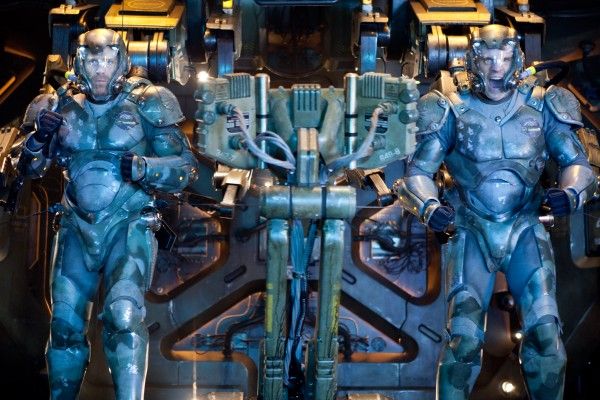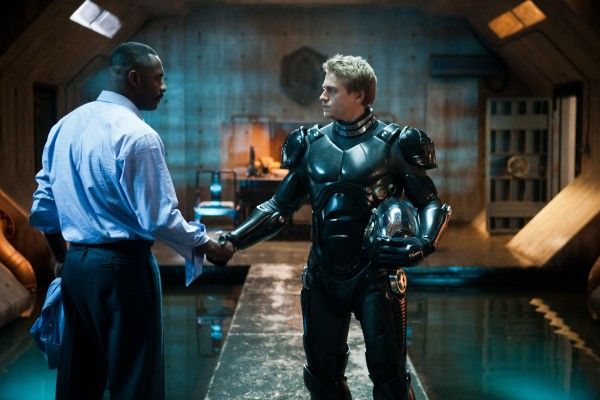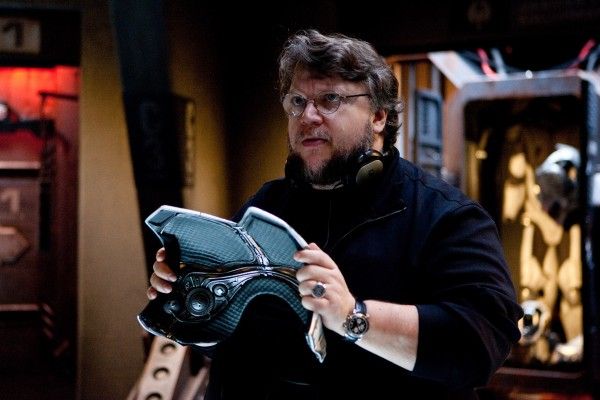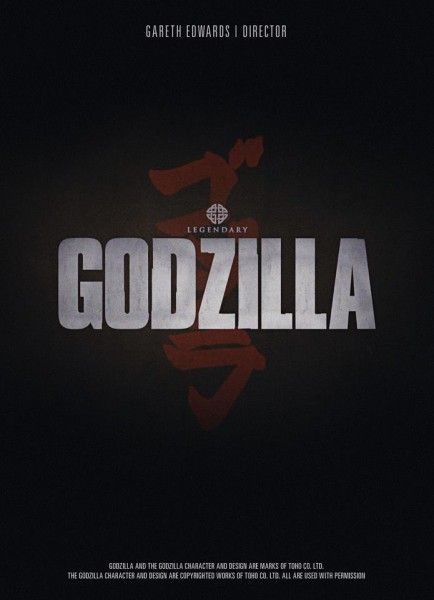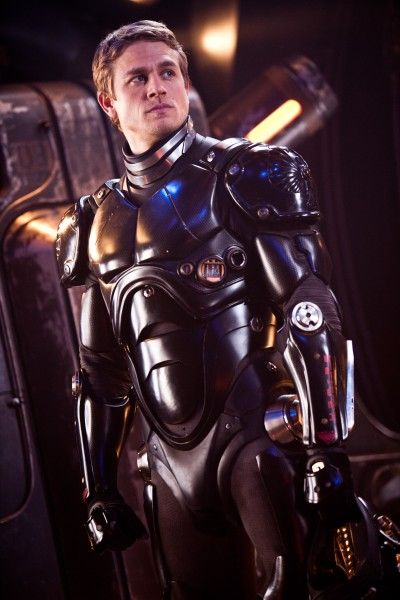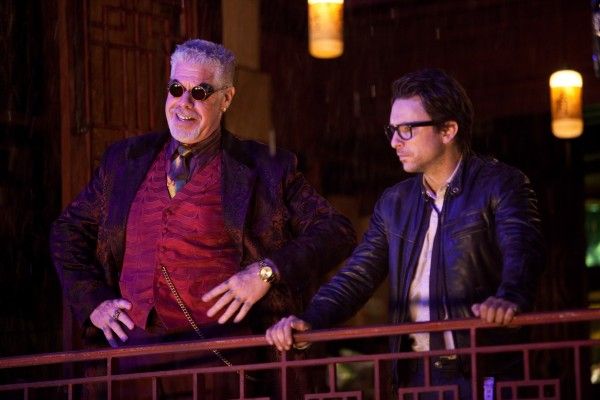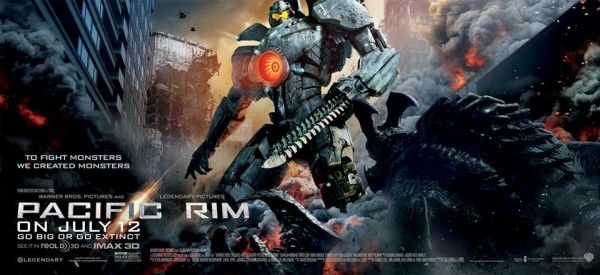At the recent San Francisco press day for Guillermo del Toro’s Pacific Rim, I landed an exclusive interview with Legendary Pictures’ CEO Thomas Tull. During our wide-ranging conversation we talked about the newest toys he's added to his collection, how Legendary is financing more of what they're producing (they financed 75% of Pac Rim and 100% of 42), if the changing home video dynamics changed the way they think about what they're producing, casting in a worldwide marketplace, if they would consider making a different cut of a movie like Marvel did with Iron Man 3 for China, how the finished film compares to what he originally envisioned, finding the right tone, Comic-Con, Godzilla, Legendary's project with Michael Mann and Chris Hemsworth, and a lot more. Hit the jump for what he had to say.
Finally, while many projects aren't worth the extra ticket price for 3D, I strongly recommend paying the extra money to see Pac Rim in IMAX 3D. It's definitely worth it.
note: this interview was done during a huge parade outside the hotel.
Collider: Starting with the most serious question, when you were making Pacific Rim was it all about setting up this parade in front of the hotel for the movie? Because clearly they are really energized in San Francisco for the film.
THOMAS TULL: We looked at this date, we circled it, and felt like no one had done this before. So to organize the parade…
[Laughs] I thought you were being serious for a second and I was like, “Oh fuck.” I have a million things to ask you, but I’m going to start with a fun question. What is the newest thing you’ve added to your personal collection of nerd stuff that you’ve collected?
TULL: I picked up a Godzilla sort of… I don’t know what you’d call it. It’s three dimensional and it’s of Godzilla, and then sort of it comes out. So it’s a maquette.
Is it from the movie?
TULL: No, no.
It’s just something.
TULL: Yeah. It’s in a box almost. So it’s Godzilla and then it’s got some tanks and stuff.
Did you get it from Sideshow? What company did it?
TULL: No, one of our minions basically found it and said, “You have to get this.” And I did.
Legendary over the last few years has gone through a transition where, from what I understand, and I could be very wrong, you financed more of Pacific Rim and Godzilla than in previous partnerships with Warner Brothers. I heard it was like 75%. Is that right?
TULL: And 100% of 42.
There we go, so my question for you is, obviously one of the reasons studios will partner with people is to mitigate risks. You are kind of saying, “Eff that, we’re going to do it ourselves.” Was there any hesitation on your part about becoming a bigger player in the financing?
TULL: You know, no, because we believe in the things were making and if we don’t we shouldn’t be doing them, and we also have the most control over the things that were developing and producing. And if you’re unwilling to bet on yourself then you’re probably in the wrong business. So it’s just from a stand point of we felt like that was the right thing to do, we believe in these things, and it’s the right capitol allocation for us.
Everyone talks about the changing dynamic of home video and economics, and things are just always in flux right now especially with digital distribution, there’s so many things that I truly don’t understand and I think it’s confusing to the average person out there. How has the changing dynamics altered the way, on your end, the way you’re financing films, the way the development process is coming together. Could you talk about the last couple years and the way the changing dynamics have affected things?
TULL: Sure, first of all I think making sure that you have great movies matters now more than it ever has. Simply because there are so many entertainment choices that you’re really vying, not just against other movies, but for people’s time and attention so from that perspective if you can’t answer the questions, beginning – Why does this matter? Do we love it? Can it be great and rise above the noise? And are you being fiscally responsible in the way in which you’re approaching this? So if you can’t answer those questions in the affirmative then you’re probably on the wrong course. But there’s no question that it is a changing landscape, and we sort of think it’s becoming more and more of the have and have-nots. If you have great stuff then you’re probably doing as much business as ever. If you don’t there’s nowhere to hide and audiences are going to let you know that right away. So you just have to be mindful of that.
International box office with certain pictures is massive, with others it’s more of a domestic thing. How have the changing international dollars and grosses maybe dictated casting or certain partnerships?
TULL: In big budget films you certainly have to think about your international audiences. It would be disingenuous to say that you don’t think about those things. To start casting, or to start really custom making your movies and making your story less-than because of those things, I think, is a slippery slope, but international box office, it’s a global business and you have to think in those terms. So it’s certainly something we consider on the big films. On smaller films, like 42 that was mostly a domestic movie, then you have to be cost-contained in a way that makes sense for that subject.
How gratifying was it that your first time financing the entire picture did great business?
TULL: To me what’s the most gratifying is just that people embraced the story, that Jackie Robinson’s legacy was honored, and people get to know what this man and his family went through. That’s certainly the most gratifying. Sitting next to and seeing the joys of Mrs. Robinson’s journey on this whole thing has been incredible. So we’ve been very, very fortunate on this movie. People seem to have liked it and we’ve done almost 100 million domestic on it. So it’s been one of the best experiences I’ve had in the business.
One of the things Marvel did recently with Iron Man 3 was add a character and some scenes specifically for China and it was very interesting for me because here is a company that understands China is a huge part of the business now. How much do you think that could also happen in other movies? Is there a chance that one day there might be certain scenes in certain movies specifically for a select audience that’s a big part of the box office? Or is it maybe that was just a one-time thing?
TULL: It’s tough to say. I mean certainly there’s nobody savvier on the marketing side than Kevin Feige and the guys over at Marvel, they do a great job and they did a lot of business on Iron Man 3 in China. So anytime money is made people will pay attention and often times copy. I think, again, being mindful of that audience is very important. We certainly have Legendary East and have an office in Beijing. On the other hand, if you start to really take away from story in sort of an inorganic way…that can be a tough thing. I think story has to drive everything, but it’ll be interesting to see how that unfolds.
Speaking specifically about Pacific Rim, I’ve seen it twice now and I can honestly say that whenever the Kaiju and the Jaegers are onscreen fighting its fucking insane, that’s the only two words I can say to describe the movie. It truly is insane. I remember Guillermo telling me last year that you guys were working on how to make it even better. Obviously when he pitched you the movie and he tells you about this stuff, to what you’re finally seeing on screen, how does it compare to what you originally envisioned?
TULL: It’s pretty damn close. In this case we were originally pitched the idea by Travis Beacham, our writer, and we went to work with Travis and brought Guillermo on board a little later. At first we thought he might just be able to be a producer, because he was going to do “At the Mountains of Madness”, and fortunately then his schedule opened up and we were able to bring him on as director. But what we kept saying was, “What would our 12 year old selves think of this?” And the idea that you could actually drive one of these Jaegers was a big differentiator for me as a fan. The idea that you and another pilot would share headspace and be able to go out and say, “I’m going to literally slay monsters with this thing and try to save the world,” I thought was pretty great. Scale was something that Guillermo talked about early and often, and also the nuances of being both a science-fiction but also having an adventure tone to it. I love the movie.
The movie's fantastic. One of the interesting things about the movie is Hollywood has been making a lot of serious movies, Man of Steel even, serious movie. A lot of films recently have been serious. But Pacific Rim knows it’s a movie. It’s having fun, and there are certain moments where it almost winks at the audience. Talk a little bit about finding the right tone, and being serious while still having fun.
TULL: Well certainly a lot of films that we’ve been involved with from Chris Nolan’s Dark Knight series, certainly Man of Steel, and some other things –as a comic book fan I want my characters to be taken seriously – just my own personal taste. On the other hand when you have something… I think about Independence Dayand movies like that where there’s humor, and there’s fun, and it doesn’t take itself too seriously, then it also offers audiences kind of a different choice. In this movie right away Guillermo brings that sensibility; when he told me that he wanted to cast Charlie Day, who I’m a big fan of, that certainly changes things up. That was one thing that we love about this cast from Charlie Hunnam to Idris, who is – I mean, I looked up badass in the dictionary and there’s Idris. And Charlie Day. And Rinko. They all just did a phenomenal job. I think for this kind of movie the tone is appropriate.
I totally agree. I have to ask about Comic-Con. Last year I’d say you raised the bar with the screens all around, it was really good. Are you kind of going from Fast 5 to Fast 6 in terms of where do we go from here after last year?
TULL: [Laughs] Well look, Comic-Con is important to our company because we love it. I’ve been going to Comic-Con far longer than I’ve started legendary and I think you constantly have to be asking what do you want to see? What would you like to experience? So this year we’ve got a few things up our sleeve and see what people think.
[Laughs] That’s a nice politician answer.
TULL: [Laughs] Yes, well.
Let me ask you this, you can walk around the comic-con floor incognito, most people do not know who you are.
TULL: [Laughs] Thank God.
Right, so when you’re walking the floor what are you looking for as a fan? And what have you seen while you’re walking around that has impacted you and maybe you’ve taken notes like “man we need to be involved with that”?
TULL: It’s interesting because Comic-Con has become so big and such a touchstone that inevitably there’s going to be some corporatization, but it’s changed a lot over the last 15 years that I’ve gone. One thing that I love is just the unbridled enthusiasm. Whether you’re watching people line up to get toys that are limited edition, or waiting in line for hours to get in Hall H to catch a glimpse at first footage for whatever the movie is, that’s the part for me that’s infectious. One of the things that I’ve seen a shift in over the past 15-16 years is going from a bunch of guys who are enthusiastic and fired up about it, to now a lot of guys and a lot of women go and are dressed up doing cosplay and doing everything else, to now they’re bringing their kids. You see a lot more families there, and you see a little guy or a little girl dressed up in their Star Wars gear or their Marvel stuff, whatever else it might be. I think that’s awesome. So that’s pretty fun. And just kind of walking around, I love going to the Sideshow toys booth. Every year they’ve got new candy.
I definitely want to ask you this – I love Hall H, but we can all agree that it holds 7,000 people and 100,000 people want to get in there. What can be done, for example with your panel – listen, you’re filming Godzilla now, I’m pretty confident you’re going to show something from Godzilla, what can be done to hook up the fans that don’t make it into Hall H? Is there a way to do something off site where you can monitor people? You know what I mean? Because there’s so many people that don’t get the full experience.
TULL: We have thought about that.
That is very cool. I’m glad that you guys are ahead of the curve on that.
TULL: Well I don’t know what we’re ahead of, but…
No, I’m glad you’re thinking because there’s a lot of fans who don’t get into Hall H and my thing is that they should either release part of the footage that they show in Hall H online so it’s not pirated, it’s not bootlegged, it looks good, or make it so there’s another place besides Hall H.
TULL: Yeah, you know, the tough thing – like when we showed the Godzilla teaser that we made last year just for Comic-Con, you have this sort of split thing in your head because you want fans to be able to enjoy it, but on the other hand I’ve had plenty of fans stop by our booth and just say, “I’ve saved up all year to come here, I waited in line all morning, and the fact that that was just for me…”
Oh yeah, that’s true. I get that.
TULL: So it’s a little bit of double edged sword because if you save up, you make the trip, you wait in line, you do all those things and then 24 hours later it’s on the internet?
No that’s a very valid point. I guess my retort to that is say you show 10 minutes of stuff and you put some of it online and some of it remains in the hall.
TULL: That is the needle that we’re thinking about and trying to thread.
You guys are making a movie right now with Michael Mann, who I’m a huge fan of, and one of Michael’s trademarks is that he’s always pushing the boundaries of technology. When you look at some of the stuff, with Public Enemies he shot mostly digital with some film, he’s always pushing. How is he pushing with what he’s doing right now?
TULL: I think you’re going to see some things that are both technically pretty incredible as well as the subject matter that were exploring I think it’s pretty cutting edge. And some of the shots and sequences he’s come up with – I can’t wait until people see it. He is…he’s Michael Mann, and that’s why we’re really excited, and the chance to work with Chris Hemsworth, who we think a lot of. So I think this is something that people will be excited about.
Touching on some other stuff, you’re working with Duncan Jones, I spoke to you a few months ago and I’m always going to find out the status of this because I love his work, where are you on that project?
TULL: Duncan’s working away and we are on the same page in terms of making sure that the script is fantastic and not just “good enough, let’s go shoot something.” So we’re really excited about where we are in the process and the things that Duncan has come up with. So we want to finish that up, but I think we’ll have more to say about that in the not-to-distant future.
So basically at Comic-Con you would like to make some announcements.
TULL: I don’t know about Comic-Con.
Obviously you’re developing other things, from the last time I spoke to you to now, is there anything else that’s bubbling up right now in terms of getting ready to go, or scripts you’re very happy with?
TULL: Yeah, one of the things that we’re very excited about it Seventh Son, Jeff Bridges and Julianne Moore, I can’t wait until people see the trailer. We had some difficulties with the effects shop that was working on the movie, which caused it to be delayed, and people shouldn’t read into that because that was just one of those acts of…there’s nothing anybody can do about. But I’m very excited for people to see that and you’re going to see a trailer on that soon, which I think should invigorate people. And the stuff that we’re getting on Godzilla is exactly what I had hoped for from Gareth [Edwards]and our cast. So we have a lot of stuff coming out over the next year.
Recently it seems, maybe it’s always been this way and I just don’t know, but it seems like more and more people are taking meetings. Shit is hitting the internet. There are loose lips everywhere. Certain companies are ultra-serious, like JJ Abrams is ultra-serious. How do you balance the desire of people reporting everything versus trying to keep some stuff until you’re ready to announce it?
TULL: It’s a difficult one because it does make you paranoid just in terms of sitting down and trying to be free and open with everybody from your creative partners to everybody involved in the process, and at the same time when you’re trying to run a business it’s very difficult to navigate. On the creative side it may simply not be ready yet. Or there’s rumors that fly around where you sit back and you go, “That’s unbelievable that people believe that.” Or it’s gotten picked up and now all the sudden it’s becomes the truth. To me the great side of the internet is instant access to everything, information all the time, speed of light, all that stuff, and global. The bad news is when you have something come out that’s inaccurate or that you wish hadn’t that it moves around just as quickly. It’s also hard because journalists these days, you know, you want to publish, you want to break stories and so forth, and there’s pressure on journalists to do that. And inevitably you’re going to have moments where you have choices to make about “Do I know this is true or not? Or do I want to give it up quickly?” So it’s all kind of a brave new world that everybody’s trying to learn from and there’s really no easy answer, but it’s something that we certainly struggle with.

